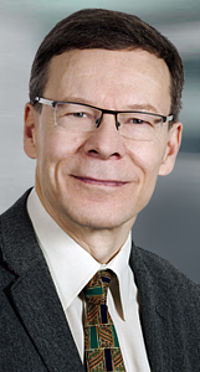Please type a search term (at least two characters)
Erkki Ikonen (Finland) is EURAMET's new Vice-Chairperson (EMPIR)

Professor Erkki Ikonen (VTT and Aalto University, Finland) was elected as new EURAMET Vice-Chairperson (EMPIR) at the EMPIR Committee held in Prague in December 2015. In January 2016, he started his term in this new position.
Following his Doctor of Technology degree at the Department of Technical Physics at Helsinki University of Technology (now Aalto University) in 1988, Erkki joined the Laboratory of Electrical Engineering at VTT, the Technical Research Centre of Finland. From 1989 to 1995 he held the position of Assistant Director of Metrology at the Electrical and Communications Engineering department at Helsinki University of Technology. Erkki has been Professor in Measurement Science and Technology at Aalto University since 1995 and at MIKES (now VTT) since 2005.
Erkki has been part of the EURAMET community for more than 20 years, where he started as member of EUROMET's Technical Committee for Photometry and Radiometry in 1994. In 2007 he joined the EMRP Committee and now the EMPIR Committee as a Representative. He took over responsibility as Deputy Chair from 2007 to 2013. He was elected as member of the EMPIR Sub-Committee on Research for the term from 2014 to 2017.
Thanks to various memberships in international committees, expert groups and long-term visits abroad, Erkki is well known in the international metrology community.
Interview with Erkki Ikonen
Erkki, as Vice-Chairperson (EMPIR) you are responsible for EURAMET's research programmes. What is special about the programmes?
What is most important about the programmes - next to the research results of course - is the great opportunity of collaboration they provide, especially between people from different National Metrology Institutes (NMIs) and Designated Institutes (DIs). This is a unique platform for people working in the field of metrology.
What will your term as Vice-Chairperson bring?
There are many fundamental topics on the agenda. For example, the mid-term review of the European Metrology Programme for Innovation and Research (EMPIR) and the final review of the European Metrology Research Programme (EMRP) in 2017. Preparation for these reviews is very important and needs input and joint efforts from different parties involved: EMPIR Committee Representatives, project coordinators and partners, and EURAMET staff.
What is your vision for EMPIR during your term and beyond?
I am taking over the position as Vice-Chairperson in a time when the programmes are successfully running, with sound governance structures, decision making and well defined responsibilities. As chair I will work for the benefit of the research programmes and EURAMET in general. Therefore, I would like to focus on the demonstration of the impact of the programmes. On the long-term view we have to think about options for a possible successor programme of EMPIR.
And what are the challenges?
The requirements for the implementation of EMPIR are different to those within the EMRP. The challenge is to make these new tools to work optimally and get people used to them. The EURAMET Management Support Unit, the coordinators of the projects, the participating NMIs and DIs and the EMPIR Committee are all doing an excellent job to achieve this goal.
The EMPIR Committee consists of 30 Representatives from different countries. What is the secret to come to good decisions with so many participants?
The Committee has a good and constructive working atmosphere and the Representatives of the EMPIR Committee are very professional. Additionally, we always have tight timeframes determined by the programme. So everyone understands that the EMPIR Committee has to work very efficiently. Nonetheless the members have the possibility to present their views on different topics and we try to find a consensus. Sometimes the nature of topics is such that we have to make decisions by voting.
If we would ask your colleagues: Which of your personal skills would they say will support you most in your new role as Vice-Chairperson?
This is a difficult question, but I think my colleagues would say that I have a strong focus on fairness. I try to treat everyone equally and to include people in democratic decision-making processes. I think this is an important skill for a chairperson.
